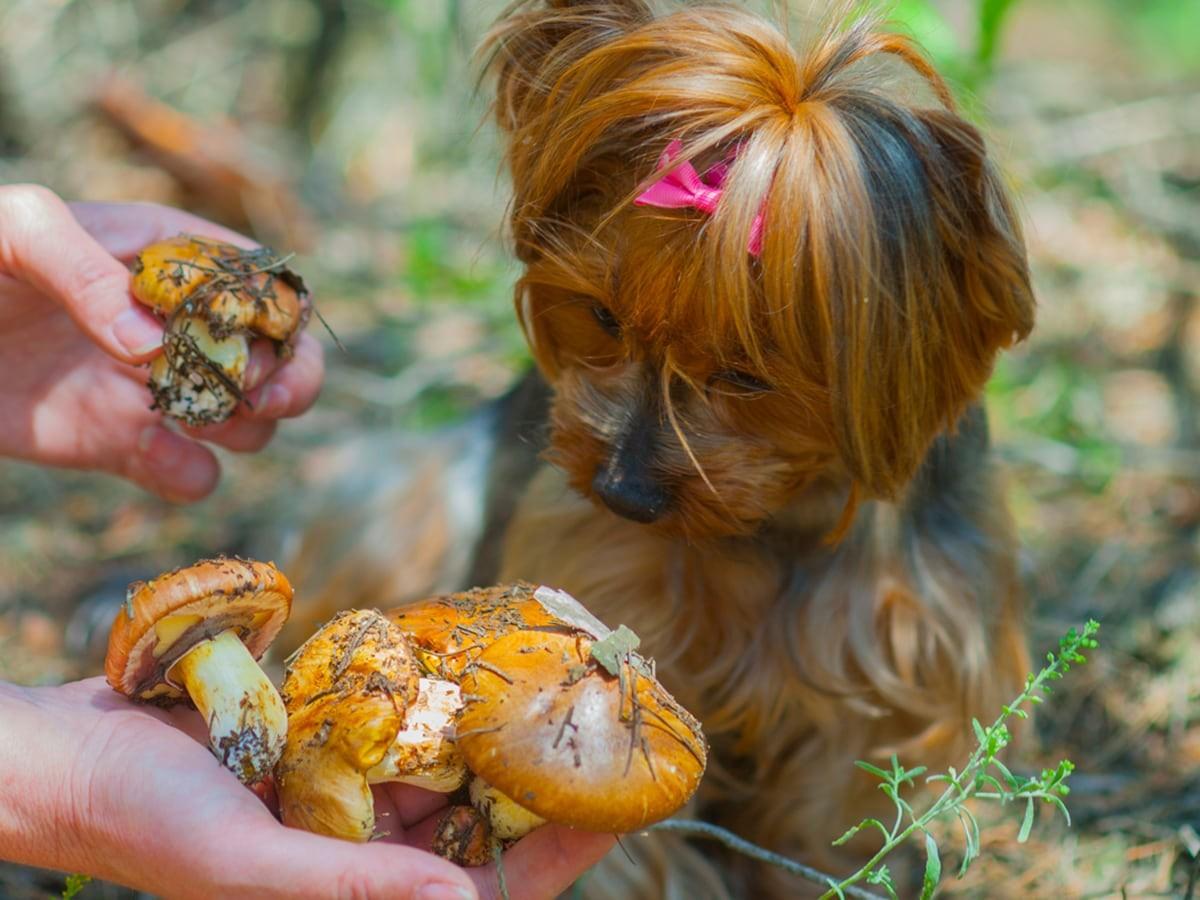Mushrooms are a great addition to any dog’s diet. They are low in fat and calories but high in protein, vitamins, and minerals. You might be wondering can dogs eat mushrooms. The answer is yes. Mushrooms also have medicinal properties that can benefit dogs’ health. Not all mushrooms are safe for dogs to eat – some can be poisonous. This doesn’t mean that your dog can never enjoy the earthy taste of mushrooms – there are actually some types that are perfectly safe for them to eat. So, can dogs have mushrooms? Let’s find out.
Types of mushrooms
There are two main types of mushrooms – those that are safe for dogs to eat, and those that aren’t. The most common type of mushroom found in yards and gardens is the white button mushroom, and these are perfectly safe for your pooch to chow down on. However, there are also some mushrooms that can be toxic to dogs, such as the death cap mushroom. These can cause liver failure and even death in dogs, so it’s important to be aware of the dangers.
Dogs can safely eat the following types of mushrooms:
White button
Cremini
Portobello
Porcini
Reishi
Shiitake
Maitake
These are mushrooms bad for dogs:
Amanita phalloides (death cap)
Galerina marginata (deadly Galerina)
Amanita gemmata (jeweled death cap)
Amanita muscaria (fly agaric)
Gyromitra species (false morel)
Inocybe species and Clitocybe dealbata mushrooms
If you’re not sure whether a mushroom is safe for your dog or not, the best thing to do is to avoid giving them any at all. If you think they may have eaten something they shouldn’t have, it’s important to seek professional medical advice straight away. With a little bit of care and attention, you can make sure your four-legged friend can enjoy all the same foods as you – without any risk. Mushrooms offer a nutritional powerhouse of vitamins, minerals, and antioxidants. They’re also low in calories and fat but high in fiber – all of which can be great for your dog’s health. Not to mention, mushrooms also have medicinal properties that can benefit dogs’ health. For example, they can help boost the immune system, fill nutrition gaps, and improve liver function.
Not all mushrooms are safe for dogs to eat – some can be poisonous. You tell can dogs have mushrooms of a certain kind if a veterinarian or an expert on the matter points them out to you. They will be able to say to you which mushrooms are safe for dogs and which ones are to avoid.
Which Mushrooms Are Dangerous for Dogs?
It is important to note that while these mushrooms are considered safe for dogs, they should be given in moderation and not as a substitute for a balanced diet. Always consult with your vet before adding any new foods to your dog's diet, especially if your dog has any underlying health conditions.
There are several types of mushrooms that are not safe for dogs and can be toxic or even deadly if ingested. Some of the most toxic mushrooms for dogs include:
Amanita mushrooms: Also known as death caps, these mushrooms contain amatoxins that can cause severe liver and kidney damage in dogs. Symptoms of amanita mushroom poisoning in dogs can include vomiting, diarrhea, lethargy, abdominal pain, and jaundice.
Galerina mushrooms: These mushrooms contain the same toxin as Amanita mushrooms and can cause similar symptoms in dogs, including liver and kidney damage.
Lepiota mushrooms: These mushrooms contain a toxin called amatoxin that can cause liver damage and other serious health problems in dogs.
Conocybe mushrooms: These mushrooms contain a toxin called psilocybin that can cause hallucinations and other neurological symptoms in dogs.
Inocybe mushrooms: These mushrooms contain a toxin called muscarine that can cause gastrointestinal and neurological symptoms in dogs.
It is important to note that these are just a few examples of toxic mushrooms for dogs, and there are many other types of mushrooms that can be harmful as well. As a general rule, it is best to assume that any wild mushroom your dog ingests is toxic until proven otherwise.
If you suspect that your dog has ingested a toxic mushroom, it is important to seek veterinary care right away. Early treatment can help to prevent serious health complications and may even save your dog's life.
Benefits of mushrooms for dogs
Mushrooms are a great source of nutrients like protein, vitamins, and minerals. They can help boost the immune system, fight cancer and improve liver function.
The nutrients in mushrooms can support liver and kidney function. They can also help improve the nutrition of weak or sick animals. Mushrooms are a great source of nutrients like protein, vitamins and minerals. If your dog is not getting enough of these nutrients from their regular diet, adding mushrooms can be a great way to supplement its diet.
Blood sugar and metabolism
Mushrooms can also help stabilize blood sugar and metabolism in dogs because they are a good source of fiber. The digestive wonder helps to regulate blood sugar levels and weight. If your dog is overweight, adding mushrooms to their diet can help them healthily lose weight by making them feel fuller for longer.
Cholesterol, weight loss and fatty liver disease
Mushrooms can also help lower cholesterol, boost weight loss, and aid in preventing fatty liver disease in dogs. As a good source of antioxidants, mushrooms can help to protect the body against cell damage and reduce inflammation. All these factors can lead to a healthier dog overall.
Viral infections
Mushrooms can also help prevent viral infections in dogs. This is because mushrooms are a good source of beta-glucans. These are a type of carbohydrates that can help to boost the immune system. By boosting the immune system, mushrooms can help to prevent viral infections in dogs.
Blood pressure
Fungi can also help reduce dogs’ blood pressure as a good potassium source. This mineral helps to regulate blood pressure and can also help to reduce stress levels. By reducing stress levels, mushrooms can help lower dogs’ blood pressure.
Heart disease
Mushrooms can also help prevent heart disease in dogs. This is because mushrooms are a good source of selenium. This nutrient is an essential mineral that helps to protect the heart from disease. Adding mushrooms to your dog’s diet can help prevent heart disease and keep your dog’s heart healthy.
Signs of toxic mushroom ingestion in dogs
Salivation
Overproduction of teats
Urination
Fatigue
Seizures
Liver failure
Bloody diarrhea
Death
What should you do if your dog ate a poisonous mushroom?
If you suspect that your dog has ingested a poisonous mushroom, it is important to seek veterinary care immediately. Early treatment can help to prevent serious health complications and may even save your dog's life.
Here are some steps you can take if your dog eats a poisonous mushroom:
Contact your vet: Call your vet or an animal poison control center as soon as possible. Provide as much information as you can about the mushroom your dog ingested, including the size, color, and shape of the mushroom, as well as the time of ingestion and any symptoms your dog may be experiencing.
Observe your dog: Keep a close eye on your dog and watch for any signs of illness or distress. Symptoms of mushroom poisoning in dogs can include vomiting, diarrhea, lethargy, abdominal pain, jaundice, seizures, and coma.
Do not induce vomiting: Do not try to induce vomiting in your dog unless directed to do so by a vet. In some cases, inducing vomiting can make the situation worse and cause further harm to your dog.
Bring a sample of the mushroom: If possible, bring a sample of the mushroom your dog ingested to the vet. This can help to identify the type of mushroom and determine the appropriate treatment.
Follow your vet's instructions: Your vet may recommend treatment options such as IV fluids, activated charcoal, anti-nausea medications, and supportive care. Follow your vet's instructions carefully and provide any necessary follow-up care or medication as directed.
It is important to note that prevention is the best way to protect your dog from mushroom poisoning. Keep your dog on a leash when out for walks, keep your yard free of mushrooms, and be vigilant when camping or hiking in areas where mushrooms may grow.
Dietary advice for dogs and mushrooms
If you want to add mushrooms to your dog’s diet, it’s essential to talk to your veterinarian first. They can help you determine if mushrooms are safe for your dog and give you dietary advice. When adding mushrooms to your dog’s diet, always start with a small amount and slowly increase the amount over time.
Easy Mushroom Recipe for Dogs
Ingredients:
Button mushrooms
Olive oil
Dried parsley
Directions
Preheat oven to 350 degrees F. Clean the mushrooms with a damp cloth. Remove stems and slice caps into thin pieces. Drizzle olive oil over the mushroom slices and sprinkle with dried parsley. Place on baking sheet and bake for 15-20 minutes. Let cool before serving to your dog.
Start with a small amount and slowly increase the amount over time.
Herbs dogs can eat with cooked mushrooms:
Basil
Oregano
Thyme
Rosemary
Sage
Parsley
Mint
Adding these herbs can help to enhance the flavor of the mushrooms and make them more palatable for your dog. Are mushrooms safe for dogs? Yes! Be careful which ones you feed them and don’t add any seasonings.
What Your Dog Can Eat As Well
There’s no shame in wanting to give our dogs whatever food will make them happy. There just happens to be many other choices out there that are much healthier and more nutritious than pretzels. Here is a list of all the junk foods that your dog can eat.
Fruits
There are many fruits that dogs can eat which are packed with vitamins, dietary fibers, and antioxidants. The best are berries like strawberries, blueberries, cranberries, and raspberries. Dogs can eat bananas, oranges, apples, melons, mangos, and pineapples. Make sure fruits with pits, stems, cores, and seeds have been ridden from these items. Several of them are choking hazards and peach pits can be toxic. Grapes of any kind are poisonous to dogs, and even raisins shouldn’t be given to them.
Seafood
When seafood is free from shells, tails, bones, and legs, they are safe for a dog to eat. Dogs can have lobster, shrimp, salmon, crab, tuna, flounder, and a variety of other fish that is lower in mercury. Fish with too much mercury fed too often to our dogs can cause mercury poisoning. Uncooked or undercooked seafood can contain harmful pathogens and bacterium like salmonella which can make a dog extremely ill. Always ensure that seafood is thoroughly cooked before feeding it to your dog.
Beans
Beans can be great sources of dietary fibers and proteins which are necessary for a dog’s health. Dogs can have a wide variety of beans, including lima beans, pinto beans, black beans, garbanzo beans, soybeans, butter beans, kidney beans, navy beans, and even green beans. Beans should always be cooked thoroughly and fed to dogs in moderation to avoid tummy aches. Beans shouldn’t replace meat in a dog’s diet, since the meat they eat is a richer source of proteins.
Vegetables
As stated earlier, garlic and onions contain toxins that are bad for dogs, and even seasonings containing traces of these vegetables could cause problems. Avocado is another poisonous food because it contains a toxic chemical called persin. Other veggies are considered great sources of fiber and vitamins for dogs. Dogs can eat carrots, pumpkins, spinach, celery, brussels sprouts, broccoli, kale, and many other vegetables instead.
Nuts
Most nuts aren’t toxic to dogs, save for walnuts and macadamia nuts. Other nuts aren’t necessarily poisonous, but they can contain lots of salts, fats, and proteins that are difficult to digest. They also aren’t very practical because they can be choking hazards due to their shapes, sizes, and shells. Cashews, almonds, and pistachios are fine for dogs to eat moderately, especially when they are made into butter which is safer to eat in terms of obstruction.

Mostly a tech person, always a pet person. I am dedicated to improving the lives of pets and their humans with technology. Off-duty, I enjoy writing about the misbehaving of computer programs and my two Aussiedoodles, Calvin and Hobbes.
*Jan 2019 to April 2024 administrator claims data
Can Dogs Eat Mushrooms? Why These Fungi Can Be Dangerous. (n.d.). In American Kennel Club. Retrieved October 4, 2024, from https://www.akc.org/expert-advice/nutrition/can-dogs-eat-mushrooms/
Medicinal Mushrooms For Dogs. (n.d.). In www.petmd.com. Retrieved October 4, 2024, from https://www.petmd.com/dog/general-health/medicinal-mushrooms-for-dogs
Real Mushrooms. (2022). Can Dogs Eat Cooked Mushrooms? Facts, Benefits, And 3 Recipes. In Real Mushrooms. https://www.realmushrooms.com/can-dogs-eat-cooked-mushrooms/
The information presented in this article is for educational and informational purposes only and does not constitute or substitute for the advice of your veterinarian.












